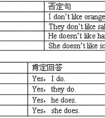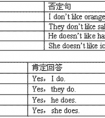句型变化。1. The book was written by Lu Xun. (改为主动语态)Lu Xun the book.2. The shoes are made by my mother. (改为否定句) The shoes by my mother.3. The -九年级英语
题文
| 句型变化。 |
| 1. The book was written by Lu Xun. (改为主动语态) |
| Lu Xun the book. |
| 2. The shoes are made by my mother. (改为否定句) |
| The shoes by my mother. |
| 3. The students wear the school clothes a lot. (改为被动语态) |
| The school clothes a lot by the students. |
| 4. The pens are used for writing words. (改为主动语态) |
| People for writing words. |
| 5.The thief caught by a policeman just now was taken into the police car. (改为同义句) |
| The thief by a policeman just now was taken into thepolice car. |
答案
| 1.wrote 2.aren't made 3.are worn 4.Use pens 5.who was caught |
据专家权威分析,试题“句型变化。1. The book was written by Lu Xun. (改为主动语态..”主要考查你对 实义动词,被动语态,定语从句,主谓一致 等考点的理解。关于这些考点的“档案”如下:
实义动词被动语态定语从句主谓一致
考点名称:实义动词
- 实意动词:
即行为动词,表示动作的动词。实义动词与系动词是相对的,能独立用作谓语。
它分为及物动词和不及物动词两种:
及物动词是指后面要求有直接宾语的动词;
不及物动词指后面不需要跟宾语的动词。 实意动词使用方法:
及物动词
后面必须跟宾语意义才完整的实义动词,叫做及物动词(transitive verb)。如:
I believe that the committee will consider our suggestion.我相信委员会将会考虑我们的建议。
“How long can I keep the book ?”Harry asked.哈里问:“这本书我可以借多久?”
Dr. Bethune set us a good example. 白求恩大夫给我们树立了好榜样。
Crude oil contains many useful substances.原油含有许多有用的物质。
不及物动词
本身意义完整后面不须跟宾语的实义动词,叫做不及物动词(intransitive verb)。如:
Birds fly.鸟会飞。
It happened in June 1932.这件事发生于一九三二年六月。
My watch stopped.我的表停了。
She spoke at the meeting yesterday evening. 她在昨天晚上的会上发了言。
兼作及物动词和不及物动词
英语里有不少实义动词可以兼作及物动词和不及物动词。这样的动词又有两种不同的情况
a)兼作及物动词和不及物动词时,意义不变。试比较:
Shall I begin at once?我可以立刻开始吗?(begin作不及物动词)
She began working as a librarian after she left school.她毕业后当图书馆管理员。(began作及物动词)
When did they leave Chicago?他们是什么时候离开芝加哥的?(leave 作及物动词)
They left last week. 他们是上周离开的。(left 作不及物动词)
b)兼作及物动词和不及物动词时,有时意义不尽相同。如:
Wash your hands before meals.饭前要洗手。
Does this cloth wash well? 这布经得起洗吗?- 英汉实意动词用法比较:
与汉语的比较,有时英语动词的及物和不及物的用法,与汉语的用法不一样,请注意下列两种情况:
a)有的动词在英语里只能用作不及物动词,而汉语则可用作及物动词,如arrive到达,agree同意,listen听。英语里这些动词后面常接介词。如:
We arrived at the railway station at noon.
我们于中午到达火车站。(at不能省去)
(比较:We reached the railway station at noon.)
Everybody listened to the lecture with great interest.
每个人都很有兴趣地听讲课。(to不可省去)
(比较:We all heard the lecture.)
Do they agree to the plan?他们同意这个计划吗?(to不可省去)
b)有的动词在英语里能用作及物动词,而在汉语里则不能用作及物动词,如serve为…服务。
Our children are taught to serve the people wholeheartedly.
我们的儿童被教以全心全意为人民服务
用于be动词之后,实义动词之前。 实意动词的用法:
肯定句:
主语+动词过去式+其它
否定句:
主语+助动词didn‘t+动词原型+其他
一般过去式:
Did+主语+动词原型+其他
考点名称:被动语态
- 语态:
是动词的一种形式,它表示主语和谓语的关系。
语态有两种:主动语态和被动语态。
如果主语是动作的执行者,或者是说动作是由主语完成的,要用主动语态;
如果主语是动作的承受者,或者是说动作不是由主语而是由其他人完成的,则用被动语态。 - 被动语态的构成:
被动语态的基本结构:
主语+be +过去分词(+by+动作的发出者)
① 一般现在时:am/is/are+过去分词
如:Trees are planted every year.
② 现在进行时 am/is/are+ being +过去分词
如:The road is being repaired.
③ 现在完成时 have/has + been +过去分词
如:The work has been finished.
④ 一般过去时 was/were + 过去分词
如:The story was told by him.
Many birds were killed last year.
⑤过去进行时 was/were+ being + 过去分词
如: The new house was being painted when I got home.
⑥过去完成时 had +been+ 过去分词
如: He told me that the work had been finished.
⑦一般将来时 will +be + 过去分词
如:The problem will be discussed tomorrow.
⑧ 过去将来时 would/should +be +过去分词
如: He said that the Christmas tree would be put up soon.
⑨情态动词的被动语态
情态动词+ be +过去分词
如:The problem must be solved soon.
Children should be taught to love animals. - 被动语态使用注意:
1. 不及物动词无被动语态。 如:happen, break down, come out......
What will happen in 100 years.
The dinosaurs disappeared about 65 million years ago.
- 最新内容
- 相关内容
- 网友推荐
- 图文推荐
| [家长教育] 孩子为什么会和父母感情疏离? (2019-07-14) |
| [教师分享] 给远方姐姐的一封信 (2018-11-07) |
| [教师分享] 伸缩门 (2018-11-07) |
| [教师分享] 回家乡 (2018-11-07) |
| [教师分享] 是风味也是人间 (2018-11-07) |
| [教师分享] 一句格言的启示 (2018-11-07) |
| [教师分享] 无规矩不成方圆 (2018-11-07) |
| [教师分享] 第十届全国教育名家论坛有感(二) (2018-11-07) |
| [教师分享] 贪玩的小狗 (2018-11-07) |
| [教师分享] 未命名文章 (2018-11-07) |


![How much does it ______ to fly from Yancheng to Hainan Island?[ ]A. cost B. payC. spend D. take-七年级英语](http://www.00-edu.com/d/file/ks/4/2/shiyidongci/2020-01-05/small7dcf2f05998de63e10cc3629787031c81578210087.png)

![He always _____TV in the evening. He _____ listening to the radio. [ ]A. watch, don't like B. watches, doesn't like C. watching, don't like D. watch, do-七年级英语](http://www.00-edu.com/d/file/ks/4/2/shiyidongci/2020-01-05/small45d599b4a60b84e61cec210bfbf051f51578214524.png)
![I'd rather ___ to the Mcdonald's Restaurant because I like to listen to quiet music.[ ]A. to go B. going C. go D. went-八年级英语](http://www.00-edu.com/d/file/ks/4/2/shiyidongci/2020-01-05/small1767bba1727fef2c035c53dcbd9bc20e1578209517.png)
